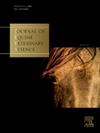Short-term equine interaction for reducing test anxiety and facilitating coping skill development in college students during examination periods: A preliminary study
Abstract
Mental health concerns are common among college students and more prevalent during examination periods when stress and anxiety are heightened. While the benefits of equine interaction have been reported, the impact of short-term equine interaction on coping skills valuable for managing test anxiety have yet to be studied. Therefore, the purpose of this preliminary study was to evaluate the impact of short-term equine interaction during the college examination period on development of coping skills and anxiety levels associated with testing, both self-reported and those reflected in physiological measures. Full-time college students engaged in a one-hour equine interaction session held on campus at the onset of final exam week. Participants completed a survey targeting perception of anxiety levels and coping skills. Heart rate and salivary cortisol measurements were collected pre- and post-session. Paired t-tests were performed between pre- and post- session measures and correlations between survey answers and physiological measures determined. Significant reductions were found in all areas of anxiety (Overall Academics P = 0.0003, Final Exam Preparation P = 0.0003, Taking Final Exam P = 0.0003). The reduction in exam-related anxiety was positively correlated to cortisol concentrations (r = 0.69, P = 0.03) with lower concentrations (P = 0.05) and increased heart rate (P = 0.003) post-session. Regarding coping skills, improvements were observed post-session in assertiveness (P = 0.008). Skill development coupled with reduced anxiety supports the potential benefits short-term equine interaction can offer students during the high stress periods, but these findings should be confirmed with more in-depth study.

 求助内容:
求助内容: 应助结果提醒方式:
应助结果提醒方式:


